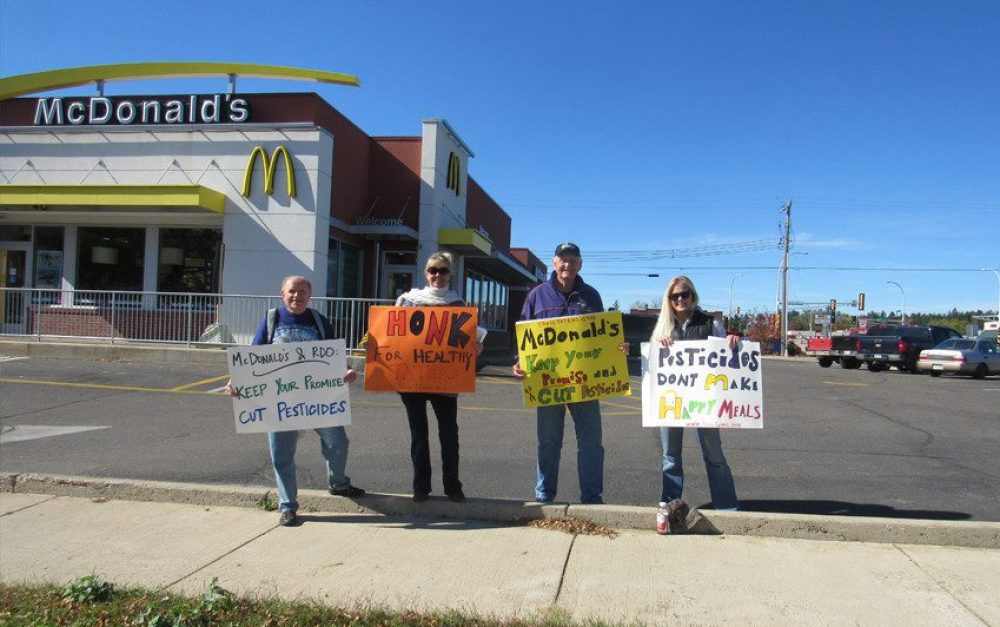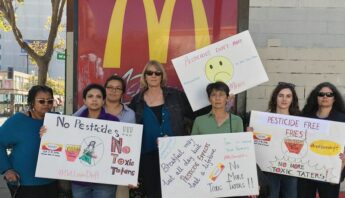McDonald’s has a long history of employing business practices that are devastating to the lives of workers and their communities. Key among these: the fast food chain continues to source potatoes grown with drift-prone pesticides that put the health of nearby rural and Indigenous communities at risk, despite claiming “sustainability priorities” and “responsible sourcing.”
McDonald’s has a long history of employing business practices that are devastating to the lives of workers and their communities. Key among these: the fast food chain continues to source potatoes grown with drift-prone pesticides that put the health of nearby rural and Indigenous communities at risk, despite claiming “sustainability priorities” and “responsible sourcing.”
In the weeks leading up to their annual shareholder meeting, PAN and partners are calling on McDonald’s to put an end to these abusive business practices — including growing potatoes with harmful, drift-prone pesticides.
A prolific pesticide problem
This issue isn’t new. A grassroots coalition of farmers, rural residents and White Earth tribal members has been working with PAN to document pesticide drift in the potato-producing regions of northern Minnesota since 2006. After several years of advocacy work and pressure on state agencies and the region’s largest potato producer, R.D. Offutt (RDO), community members launched the Toxic Taters coalition in early 2014.
Toxic Taters is urging that Mcdonald’s require its potato suppliers, like RDO, to reduce their use of health-harming pesticides and require growers use safe, sustainable practices in their production. As the largest potato buyer in the country, McDonald’s can influence the market tremendously.
Empty promises
In 2009, McDonald’s made a high-profile public commitment to work toward pesticide reductions on the potatoes they purchase. However, the company’s follow-through has fallen short of tangible outcomes.
Then in 2014, McDonald’s released new 2020 Corporate Social Responsibility and Sustainability goals, hoping to convince shareholders the corporation was headed in a more environmentally and socially responsible direction. But these were without firm commitments, and McDonald’s itself admitted the goals were “aspirational.”
Today, the Mcdonald’s website claims,“We make it our responsibility to provide quality, great-tasting and responsibly sourced food.” They tout sustainability priorities, positive impacts for the planet and community engagement as core values of the McDonald’s culture. Like their previous attempts to placate shareholders, these values lack firm commitments as well.
Doubling down
That’s why we’re putting pressure on the corporation around this year’s shareholder meeting. With partners at Corporate Accountability, Food Chain Workers Alliance, HEAL Food Alliance, Restaurant Opportunities Centers United and Toxic Taters, we’ve already gathered almost 20,000 signatures demanding McDonald’s to take real, meaningful action to deal with its pesticide problem, and put an end to other abusive policies.
McDonald’s also pays poverty wages and denies benefits to their workers, practices predatory marketing of junk food to children and pushes their corporate agenda — particularly on the subminimum wage — through trade groups like the National Restaurant Association.
People are paying attention and seeing straight through McDonald’s corporate spin. Stand with workers and communities in potato-growing country and urge McDonald’s executives to better their unjust business practices.







